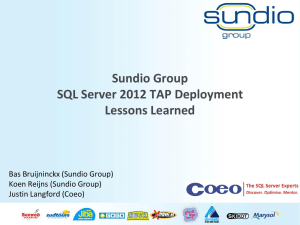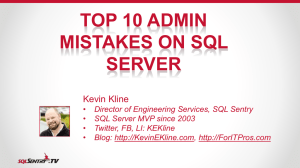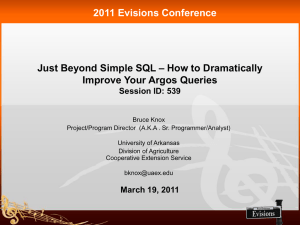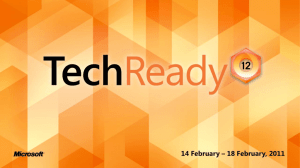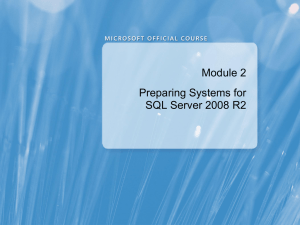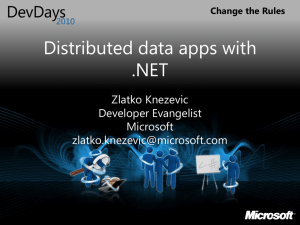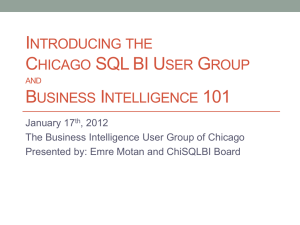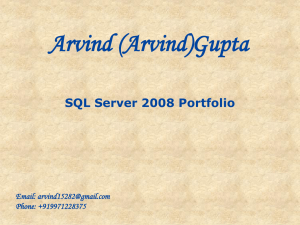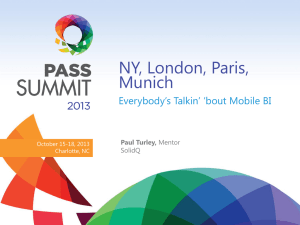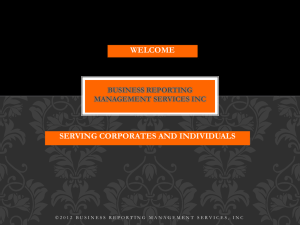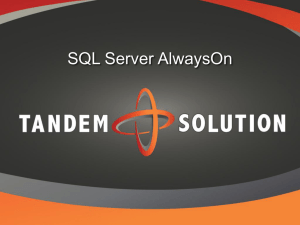DATABASE DEVELOPMENT
advertisement
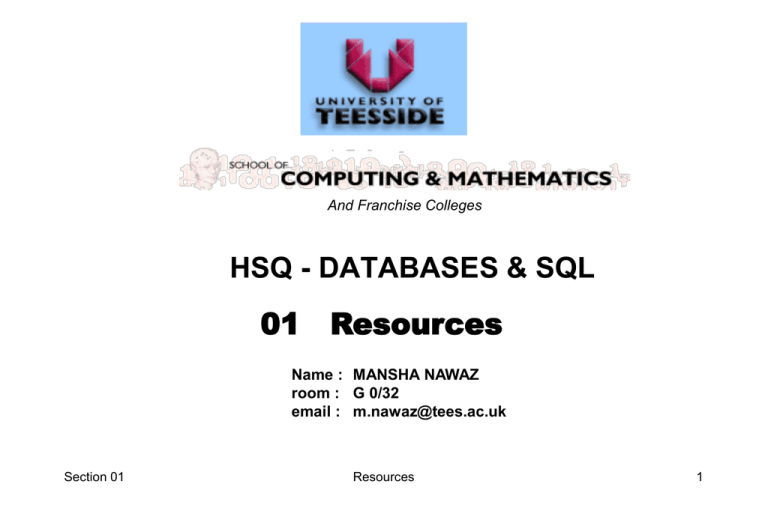
And Franchise Colleges HSQ - DATABASES & SQL 01 Resources Name : MANSHA NAWAZ room : G 0/32 email : m.nawaz@tees.ac.uk Section 01 Resources 1 Module Specifications HSQ CAMS2 Module Description HSQ Databases & SQL Module Guide Assessment OUT Week 6 : IN Week 14 : Development of a SQL Database from a Case Study • • marked on criteria F R P M D ER Model MS SQL Implementation Section 01 Resources 2 Resources I – Mansha Nawaz Staff Page Mansha Nawaz staff page defaults to the Module Page. Locate and click on your module to be directed to the appropriate Web Page. Click on Your Module in this list Section 01 Resources Web Page List for SAD - Systems Analysis and Design DD - Databases & SQL project - Individual Project ccc - Comms Case Study resources - Additional Resources 3 Resources II – Databases & SQL Website Section 01 Resources 4 Online Resources III M. Nawaz Staff page • Lectures • Lecture Notes ** REVIEW POWERPOINT SLIDES BEFORE LECTURE • Lecture focuses on Worked Examples, Scenarios and Problem Statements • Practices • • • • • Paper based designing a database from a scenario SQL SERVER – implementation of database systems Populating the database with some test data. Writing and Testing SQL Queries. Appraisal of SQL syntax • Answer Pointers & Solution • Consolidate and check with Answer Points • provided online only – see resource III • Self Study • exercises, reading and consolidation Section 01 Resources 5 Resources IV MS SQL SERVER 2008 MS SQL SERVER 2008 STUDENT EDITION from MSDNAA installation guide – similar to 2005 edition Section 01 Resources 6 MSDN – MS SQL Server 2005 Online Videos http://msdn2.microsoft.com/en-us/express/aa718391.aspx • • • • Learning Resources - Video Series: SQL Server 2005 Express Edition for Beginners Getting Started with SQL Server Express This video series is designed specifically for SQL Server beginners—individuals who are interested in learning the basics of how to create, manage, and connect to SQL Server Express databases. Whether you’re just a beginner or somewhat familiar with databases, these video lessons will help you get better acquainted with SQL Server 2005 Express. The series includes almost 9 hours of video-based instruction that walks SQL Server beginners through the steps of learning about SQL Server databases to actually connecting a SQL Server database to a Web application. Select your starting point below based on your skill set. – – – – – – – Introduction • Learning Video 1: What is a database? Designing Tables • Learning Video 2: Understanding Database Tables and Records • Learning Video 3: More about Column Data Types and Other Properties • Learning Video 4: Designing Relational Database Tables Database Functions • Learning Video 5: Manipulating Database Data • Learning Video 6: More Structured Query Language • Learning Video 12: Creating and Using Stored Procedures • Learning Video 13: Enabling Full-Text Search in your Text Data Creating and Using Reports • Learning Video 10: Getting Started with Reporting Services • Learning Video 11: Embedding, Packaging and Deploying SQL Server Express Reporting Services Database Security • Learning Video 7: Understanding Security and Network Connectivity Database Management • Learning Video 9: Using SQL Server Management Studio Express Publishing to the Web • Learning Video 8: Connecting your Web Application to SQL Server 2005 Express Edition Section 01 Resources 7 Resources V – Free Data Models Section 01 Resources 8 Resources IV • ASCENT – A Case Tool for Data Modelling via ERD in Ascent – available in PC labs – Tutorial & video support on Intranet • ASCENT student version – ASCENT21_02h.zip – Need WinZip – Download available on DD Web-Site • ASCENT is not bug-free so SAVE WORK REGULAR • Ascent files .asc need to be ZIPPED (winzip) if you are emailing solutions to tutors Section 01 Resources 9 Resources VII - ADDITIONAL RESOURCES WEB SITE Mansha Nawaz SCM Modules SAD Database Individual Project resources Additional Resources Systems Development WEB Development Human Computer Interface Database Development Systems Development Implementation A. Siedle Report Writing Booklets Database Development SAD - Dennis, Wixom Online Web Book MS SQL Server 2000 Download Microsoft Evaluation Download Software Architecture Online Web Book SQL User Guides SCM Systems Design and Analysis Prof. Kam-Fai WONG sql-2000-admin SQL Online Training sql-2000-prog SQL Online Training www.w3schools.com SQL Online Training WEB Development Web Design Methodology December Web Site Sql Query Tutorial SQL Online Training Usable Web Issues HCI Virtual Library SQL Tutorial SQL Online Training Web Techniques HCI Virtual Library MS SQL 2000 Support SQL Online Training Indiana Searchable Index Portfolio-Web Design www.sqlcourse1.com SQL Online Training Web Users Guide SCM www.sqlcourse2.com SQL Online Training www.aspfree.com ASP Web Site www.dcs.napier.ac.uk SQL Online Training Web Building W3 School Web Site www.1keydata.com SQL Online Training Internet & Web Design tutorials Computer Training S/W Web - DB linkage from a student report Upload Web Pages SCM Human Computer Interface Human Computer Interface HCI Dialogue Styles HCI Menus v Forms HCI - Users A. Siedle Report Writing Booklets Report Writing Minutes of Meetings Section 01 Interviewing Presentations Implementation Prototyping Requirements & Tasks System Evaluation Testing User Guide Example Resources 10 Resources VIII – PROJECT WEB SITE Section 01 Resources 11 MS SQL Server V MS Access • MS SQL Server is Server – Client Based • MS Access is Desktop based • Large, high volume traffic database systems • Small, low-traffic database systems • Generally, database servers like MS SQL Server are the way to go for database or web/database systems • Small, low-traffic web sites requiring database connectivity. • Cannot handle heavy traffic from multiple users. • For web or database systems if the access traffic is likely to generate more than 20 concurrent database hits at a time, it's time to move to a database server • • MS SQL Server MySQL (if you don’t need relational database). Section 01 Resources 12 Important …. • As part of your course in the final year you will be asked to undertake a systems development project. – – – – – This kind of project is where you produce a clearly defined system. The system is intended to meet the needs of a client; the project proposer. The project has a deliverable system (or product) An application (a piece of software) A majority of such work require a database. • When you enter the real-world you are the computer expert – – – – – participate in systems development. propose, convey and agree a computer system determine how these requirements are to be achieved implement and build the system A majority of such work require a database. • HSQ is vital for your long term System Development skills – Future career Section 01 Resources 13 Databases & SQL Website • The Database & SQL website is the FIRST point of contact for module based information. It contains : – – – – – – • • • • Lecture notes, Practicals & Solutions, Self Study material MS SQL material and resources Supplement information and background reading. Links to other useful resources. Assessment information - soon Anything else useful! You are expected to review the material in advance of the lecture period. The lecture booklet is essential reading material. Website contains much more useful information and resources The website is updated on a regular basis Section 01 Resources 14 Course Material Summary Do not cover ALL material in the 12 teaching weeks. Focus on reviewing each of the sections Attempt at least one exercises from the weekly practical. • • • • The aim is for you to be proficient in modelling server oriented database large scale multi –user systems be able to implementation in MS SQL Server proficient in SQL (the database definition and query language). The module requires a commitment of several hours each week on Both theoretical and practical study If you devout additional time there is sufficient material for you to become a professional database developer in MS SQL Server. Section 01 Resources 15 Student Feedback Whilst studying this module, students undertake: 1. Formative work (designed to develop students' skills, but not contributing to the mark/grade for the module) 2. Summative assessment (contributing to the module mark/grade). This module provides student feedback in a number of ways: • For FORMATIVE WORK – feedback provide in terms of Model Answers and Solutions for all sections • For SUMMATIVE ASSESSMENT (ICA) – feedback provided via a Criteria Referenced grade sheet – Sample student reports and ICAs • Throughout practical sessions – There is no feedback if you have nothing to show or demonstrate !!! Section 01 Resources 16 Further Reading Supplement 01 Database Introduction -1Supplement 02 Database Introduction -2- available online Section 01 Resources 17

